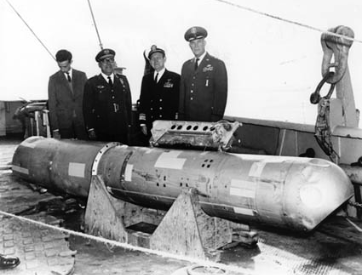
B28FI nuclear bomb recovered after it fell into the ocean following the January 1966 midair collision between a nuclear-armed B-52G bomber and a KC-135 refueling tanker over Palomares, Spain (Photo: U.S. Navy, Courtesy of the Natural Resources Defense Council)
On Tuesday, the Supreme Court denied an appeal made by a group of Veterans seeking disability compensation for exposure to radiation during the 1966 Palomares Hydrogen Bomb Accident.
The decision has left the Veterans, including 80-year-old Air Force Veteran Victor Skaar, without the support they were hoping for. Despite the justices offering no comment, this ruling upholds a previous decision by a federal appeals court, dealing a blow to the Veterans’ quest for recognition and assistance.
The Palomares Hydrogen Bomb Accident
The incident at the center of this case occurred on January 17, 1966, when a U.S. B-52 bomber and a refueling plane collided above the village of Palomares in southern Spain. Miraculously, no fatalities occurred on the ground, but the collision resulted in the release of four U.S. hydrogen bombs. Although none of the bombs detonated, two of them had plutonium-filled detonators that exploded, scattering approximately 7 pounds of highly radioactive plutonium 239 across the surrounding area. This event has been labeled as the most severe radiation accident in U.S. history.
The Veterans’ Struggle for Recognition
Victor Skaar, along with others who were involved in the recovery and cleanup efforts following the Palomares incident, filed class-action claims seeking disability benefits. They asserted that their exposure to radiation during their service caused them to develop various illnesses and conditions. Skaar himself suffers from leukopenia, a condition potentially linked to radiation exposure, and has previously battled skin cancer. Despite their pleas, a federal appeals court rejected their claims, and the Supreme Court’s recent decision has upheld that ruling.
The Justice Department’s Response
The Justice Department opposed the review of the case by the Supreme Court, pointing out that Congress had recently passed legislation expanding eligibility for benefits for many Palomares Veterans. However, it was acknowledged that Victor Skaar and his specific circumstances were not covered under the new legislation. This setback has left the Veterans and their legal team disappointed and frustrated, as they believe their sacrifice and the subsequent health issues resulting from the radiation exposure should warrant recognition and support.
The Long-Term Effects on Veterans
Approximately 1,600 servicemen were deployed to Palomares to recover the weapons and decontaminate the area. These individuals faced daily exposure to dangerous levels of radiation for weeks or even months, leading to the development of various cancers, blood disorders, heart and lung problems, and other illnesses. Despite enduring these health issues directly related to their service, the Veterans have been met with significant barriers when seeking acknowledgment and assistance from the government.
The Supreme Court’s decision to reject the appeal of Veterans seeking disability benefits for their exposure to radiation during the 1966 Palomares Hydrogen Bomb Accident is a blow to those who have suffered the consequences of this nuclear disaster. Despite the passage of time, the impact on the Servicemen involved remains evident, with numerous health issues and conditions arising as a result. The lack of recognition and support from the government undermines the sacrifices made by these Veterans, highlighting the need for ongoing efforts to ensure their well-being and rightful compensation.












